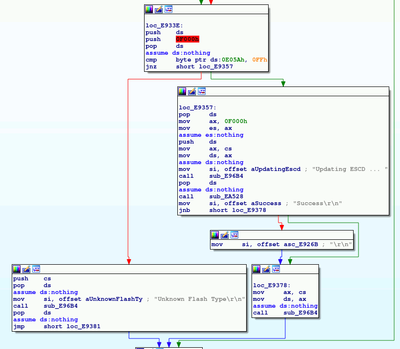I found a NexCom PEAK 650VL2 BIOS (T1.3a) from https://theretroweb.com/motherboards/s/nexcom … 50vl2#downloads
Here is how you can find the list of chip IDs from an Award BIOS, assuming you are on a Linux platform and have awardeco installed. You could substitute your own Award BIOS dumping utility.
1. Dump the components of the BIOS, we need awardext.rom:
$ awardeco P650T13a.BIN -x
2. Disassemble the awardext.rom to a text file for later use:
$ objdump -b binary -m i8086 -D awardext.rom > awardext.txt
3. The read identifier command is 0x90. Award sets up the ES: segment register to point to the location of the Flash chip. Find the instruction sending this command to the chip:
$ grep 'mov.*\$0x90,%es:0x0' awardext.txt
d9e1: 26 c6 06 00 00 90 movb $0x90,%es:0x0
4. Figure out where that function is being called. The last call before the first ret is a call to the function that looks up the ID in the known ID table:
$ grep --after-context=9 0xd9e1 awardext.txt
...
d9c7: e8 17 00 call 0xd9e1
d9ca: 26 8a 26 01 00 mov %es:0x1,%ah
d9cf: e8 04 00 call 0xd9d6
d9d2: e8 ff 00 call 0xdad4
d9d5: c3 ret
...
5. Looking at the known ID lookup function, the address of the known ID table gets loaded into si, the number of entries in cx, and in the body of the loop the size of each entry gets added to si:
$ grep --after-context=10 dad4: awardext.txt
dad4: 1e push %ds
dad5: 06 push %es
dad6: 0e push %cs
dad7: 1f pop %ds
dad8: be d8 d8 mov $0xd8d8,%si
dadb: b9 0d 00 mov $0xd,%cx
dade: 3b 04 cmp (%si),%ax
dae0: 74 08 je 0xdaea
dae2: 83 c6 0a add $0xa,%si
dae5: e2 f7 loop 0xdade
dae7: f9 stc
6. In this BIOS the table is at 0xd8d8 and there are 0xd (13) entries in the table and each entry is 0xa (10) bytes long and the first two bytes of each entry are the chip vendor and device ID.
$ od -A n -j 0xd8d8 -N 130 -t x1 awardext.rom | tr -d '\n' | awk '{ for (i = 1; i <= NF; i += 10) print $i, $(i+1) }'
01 a4
97 94
c2 a4
1c 04
37 86
dc 04
ad 40
89 ad
89 ac
20 2c
bf 58
bf 60
bf 51
7. Looking up the device/vendor IDs here (https://ctrl-alt-rees.com/2022-07-03-eprom-de … ce-id-list.html), they seem plausible.
01A4 - AM29F040B
9794 - ?
C2A4 - MX29F040
1C04 - M5M27256
3786 - A29040
DC04 - ?
AD40 - ?
89AD - 82802AB
89AC - 82802AC
202C - M50FW040
BF58 - SST49LF004
BF60 - SST49LF004A/B
BF51 - SST49LF040*PLCC32
